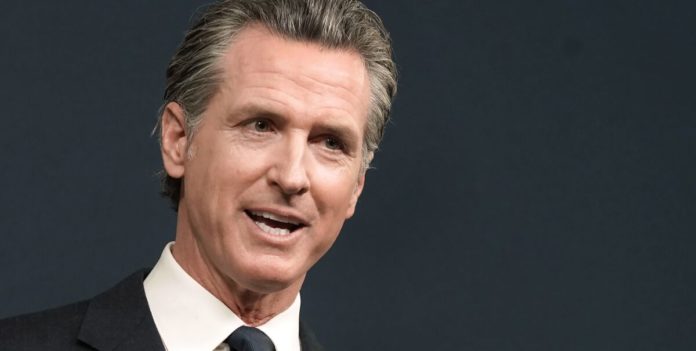California’s ultra-rich will not have to pay a modest tax increase to encourage the adoption of electric cars in California. This is due to a vigorous opposition campaign led by Democrat Governor. Gavin Newsom. Some critics believe that Newsom’s efforts in stopping this measure show that he is not only eco-friendly in words, but also billionaire-friendly in practice.
Proposition 30 was up for election this week. Proposition 30 was a 1.75% increase in tax for those making more than $2 million annually. It was intended to help subsidize state adoption of “zero emission” vehicles and the development and maintenance of EV charging infrastructure.
Approximately 45% would have been used to pay for new electric vehicles (e.g. cars, vans and pickup trucks); 35% would be used to subsidize the installation of EV charging stations in private and public locations. Wildfire response and prevention would receive 20%. Priority would go to state firefighters, including training and hiring.
California Legislative Analyst’s Office stated that the tax would generate between $3.5 billion to $5 billion per year, and “growing over time.”
Even though it would be a drop in the bucket considering California’s transition from a 100% renewable-powered electric grid, it wouldn’t hurt to have additional revenue.
59% of California voters rejected it.
The votes of support were cast by Alpine, Humbolt and Mendocino Counties, while the rest of the state voted against it.
The No on 30 campaign successfully secured nearly two points of each California multimillionaire’s income. In a statement, it stated that “California voters decisively rejected the poorly crafted, unnecessary tax increase. … Proposition 30 was actually a solution to an existing problem that the state is currently addressing.”
Aside from eco-friendly rhetoric
Mary Creasman (CEO of California Environmental Voters) was a supporter and advocate of the proposition. She said that Newsom, who was the face of California’s No on 30 campaign, was responsible for the measure’s defeat.
Creasman stated that the proposition was opposed by a record number billionaires, had been lied to repeatedly and had the support of the most popular Democratic leader in the country.
Matt Rodriguez, No on 30’s campaign manager, stated, “You cannot remove the governor from it… [Newsom] is a credible messenger from the opposition side, simply as I think of many people and a number of Democrats take his cues.”
Newsom fought against the proposition by appearing in a TV advertisement, where he claimed that it was “a Trojan Horse that places corporate welfare above the fiscal wellbeing of the entire state.”
Newsom and others suggested that Lyft would benefit directly from the measure after it had allegedly contributed over $35 million in cash or in-kind contributions.
Bill Magavern was one of the bill’s authors and is the policy director for the Coalition for Clean Air. He criticised Newsom for how he characterized the measure. He suggested that the real issue was “billionaires” and their allies, who don’t want to pay their fair share.
Some wealthy backers supported the opposition campaign in which Newsom was the most well-known face.
Bob Emery, a San Francisco real estate investor and billionaire, donated almost $500,000 to the opposition campaign. Arthur Rock, a former Apple board member and Silicon Valley Venture Capitalist, donated $499,000. William Fisher, director of Gap Inc., donated $980,000 to No. 30 Campaign in September.
Newsom’s attack ad in which Lyft was suggested as the primary beneficiary was funded by Michael Moritz, a California billionaire who has previously donated $1 million to fight Proposition 30.
Creasman suggested, “zero emission” programs and a radical phase-out for gas-powered cars by 2035. Creasman said that the failure to pass the proposition places more pressure on Governor Creasman to find new revenue streams.
“Where is the money going?” Creasman asked. Creasman replied, “If the governor has any exciting, innovative, new stuff that he can pull from his pocket and say, “Here’s how it’s going to be paid for,” we are all in.”
Teachers’ unions demanded their cuts
Newsom opposed the proposal not only with billionaires who are hesitant to pay down their champion’s promises but also with two of the largest teacher’s unions in the state. It would have been politically impossible to cross the former.
California Teachers Association, which opposed Newsom’s recall in 2021 was against the tax, because it would have been a fund special (i.e. the “Clean Cars and Clean Air Trust Fund”) Accordingly, money could have been withheld from education funds in a state where 40% of its budget is sucked into public education per a 1998 mandate.
Cathy Abernathy, a Republican political analyst, explained in October why Newsom and California Teachers Union fought against eco-tax. It “is a special fond, permanently distinct and apart from any other state funds or accounts. In Section (c), the money deposited in the fund and any interest earned may not be borrowed, loaned, transferred or permanently transferred to the General Fund of the state treasury.
Newsom’s administration would not be able to access the tax revenue like the teachers’ unions.




